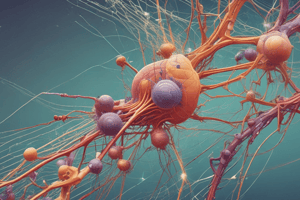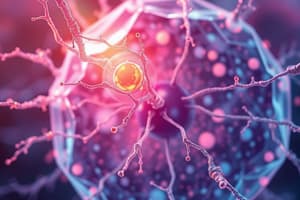Podcast
Questions and Answers
What is the primary function of microfilaments in the cytoskeleton?
What is the primary function of microfilaments in the cytoskeleton?
- Transporting nutrients within the cell
- Generating movement and providing mechanical support (correct)
- Facilitating the synthesis of proteins
- Providing energy for cellular processes
Which of the following statements is true regarding the endoplasmic reticulum?
Which of the following statements is true regarding the endoplasmic reticulum?
- Rough ER is primarily responsible for synthesizing lipids.
- Both types of ER have identical structures.
- The endoplasmic reticulum connects to the nuclear envelope and extends throughout the cytoplasm. (correct)
- Smooth ER is involved in protein synthesis primarily.
What is the role of the centrosome during cell division?
What is the role of the centrosome during cell division?
- To form the mitotic spindle (correct)
- To synthesize proteins for the new cells
- To encapsulate the nucleus during division
- To transport organelles to the dividing cells
What distinguishes flagella from cilia?
What distinguishes flagella from cilia?
Which of the following components is NOT typically found dissolved or suspended in the cytosol?
Which of the following components is NOT typically found dissolved or suspended in the cytosol?
What primarily defines the structure of ribosomes?
What primarily defines the structure of ribosomes?
Which type of molecules do glycoproteins consist of?
Which type of molecules do glycoproteins consist of?
What primarily accounts for the volume composition of the cytosol?
What primarily accounts for the volume composition of the cytosol?
What feature is true of glycogen granules in the cytosol?
What feature is true of glycogen granules in the cytosol?
What is the main function of cilia on the surface of cells?
What is the main function of cilia on the surface of cells?
Flashcards are hidden until you start studying
Study Notes
Cytosol
- The fluid portion of the cytoplasm that surrounds organelles.
- 55% of total cell volume.
- Contains 75–90% water, ions, glucose, amino acids, fatty acids, proteins, lipids, ATP, and waste products.
- Includes organic molecules: lipid droplets (triglycerides) and glycogen granules.
Microfilaments
- Thinnest elements of the cytoskeleton.
- Composed of actin and myosin proteins.
- Most prevalent at the cell’s edge.
- Functions:
- Generate movement: muscle contraction, cell division, cell locomotion (e.g., embryonic cell migration, white blood cell invasion, wound healing).
- Provide mechanical support: contribute to cell strength and shape.
Organelles
- Specialized structures within a cell.
- Have characteristic shapes and perform specific functions.
- Essential for cellular growth, maintenance, reproduction, and homeostasis.
Centrosome
- Located near the nucleus.
- Consists of two centrioles and pericentriolar material.
- Pericentriolar material forms the mitotic spindle during cell division.
Cilia
- Numerous, short, hairlike projections on the cell surface.
- Each cilium has a core of 20 microtubules surrounded by plasma membrane.
- Move fluids along a cell surface.
Flagella
- Similar structure to cilia but typically much longer.
- Move an entire cell with a wavelike motion.
Ribosomes
- Sites of protein synthesis.
- Consist of two subunits (large and small) that are attached to the nuclear membrane and the endoplasmic reticulum.
Endoplasmic Reticulum (ER)
- Network of membranes in the form of flattened sacs or tubules.
- Extends from and connects to the nuclear envelope.
- Two distinct forms: Rough ER (RER) and Smooth ER (SER).
Rough Endoplasmic Reticulum (RER)
- Synthesizes glycoproteins and phospholipids.
- Transfers these molecules to cellular organelles.
- Inserts them into the plasma membrane.
- Secretes them during exocytosis.
Smooth Endoplasmic Reticulum (SER)
- Synthesizes fatty acids and steroids (e.g., estrogen, testosterone).
- Inactivates or detoxifies drugs and harmful substances.
- Stores and releases calcium ions that trigger muscle contraction.
Studying That Suits You
Use AI to generate personalized quizzes and flashcards to suit your learning preferences.





